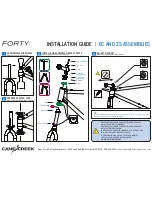
These operating instructions are a publication by Conrad Electronic SE, Klaus-Conrad-Str. 1, D-92240 Hirschau (www.conrad.com).
All rights including translation reserved. Reproduction by any method, e.g. photocopy, microfilming, or the capture in electronic data
processing systems require the prior written approval by the editor. Reprinting, also in part, is prohibited.
These operating instructions represent the technical status at the time of printing. Changes in technology and equipment reserved.
© Copyright 2016 by Conrad Electronic SE.
Installation
The range between the wireless bell push and the wireless chime is dependent on the
environmental conditions. As a rule, when operated in a single-family home, faultless
operation should be possible. We recommend that you check the function of the prod-
uct before the final installation.
Pay attention when drilling and tightening the screws that no cable or pipes are dam-
aged.
a) Wireless chime
• The wireless chime can be hung from a nail, hook or screw, using an opening on the back.
• Alternatively, it can be attached to a small stand. Place the wireless chime on a level, stable, and
sufficiently large area. Protect valuable furniture surfaces by using a suitable mat to prevent
scratches.
Be careful not to let the wireless chime get damp or wet. Only operate the product in
dry, enclosed indoor rooms.
b) Wireless doorbell button
Mount the wireless doorbell button in such a way so that that the lock button is visible
(in order to remove the front lid in case of a battery change) on the bottom side (the
round sensor surface is on the right side).
If this precaution is ignored, water can penetrate into the wireless doorbell button, which
in case of damage, will result in the loss of warranty.
The wireless doorbell button can be mounted on the wall in a single position; the clips
on the wall bracket top and bottom are different. During installation of the wall holder,
make sure it is mounted tightly and securely.
• Using the wall bracket, you can mount the wireless doorbell button vertically on a flat wall.
• Use, depending on the wall type, appropriate screws and if necessary dowels. Also, fixing the
button using double-sided tape is possible, if the wall is smooth, clean and free of dust.
Operation
a) Choosing the ring tone
Switching to the next ring tone is done by pressing the left button of the wireless chime. For check-
ing the ring tone, the melody is played once.
This means that there are 48 different ring tones available.
b) Choosing the sound volume
This is done by pressing the right button of the wireless chime, which allows you to adjust the
volume during playback in 4 steps.
c) Pressing the wireless doorbell button to trigger a ringing signal
Touch the doorbell button on the round sensor surface which is marked with the bell symbol. A LED
on the inside of the sensor surface will light up briefly.
You do not need to press on the sensor surface - it is sufficient to slightly touch it.
The wireless doorbell button will now send out a radio signal, which results in the chime being
activated. It will output the currently selected ring tone.
d) Connecting an AC adapter
If the wireless chime is triggered frequently, this automatically reduces the operating time of the
batteries inserted.
You can therefore either use battery packs to power the wireless chime or connect the device to
an external power supply (not included, can be ordered separately).
An adapter is required with a stabilised output voltage of 5 V/DC and an output current
of 500 mA. The round low-voltage plug must have an external diameter of 4 mm and
an internal diameter of 1.7 mm. The outer contact of the round plug should be labelled
minus/”-”, while the inner contact must be marked with plus/”+”.
When using an external power supply, the batteries from the wireless chime should
be removed.
Range
The transmission range for the radio signals between the components is up to 150 m under opti-
mum conditions.
This value, however, is the so-called “open space range” (the range the transmitter and
receiver are visible to each other, without disturbing influences).
In practice, however, there are walls, ceilings of rooms, etc. between the transmitter and the re-
ceiver, which reduce the range accordingly.
Due to the different influences on the radio transmission, no specific range can be guaranteed.
However, trouble-free operation is usually possible in a single family house.
The range can sometimes be considerably reduced due to:
• Walls, reinforced concrete ceilings
• Coated/metallised insulated glass
• Proximity to metallic & conductive objects (e.g., heating elements)
• Proximity to human bodies
• Devices on the same transmission frequency (e.g., baby monitoring systems, wireless cameras,
etc.)
• Proximity to electric motors, transformers, power-supply units, computers
Maintenance and cleaning
The product does not require any maintenance apart from a possible replacement of the recharge-
able battery.
Any maintenance or repair work must only be carried out by authorised personnel/workshop.
The outside of the housing should only be cleaned with a clean, soft, dry cloth. Never use aggres-
sive cleaning agents or chemical solutions since these might damage the surface of the casing or
impair the operation.
Disposal
a) General
The product must not be disposed in the household waste.
Dispose of the product at the end of its serviceable life in accordance with the current
statutory requirements; e.g., return it to any suitable collection point.
Remove any normal or rechargeable batteries inserted and dispose of them separately
from the product.
b) Disposal of spent rechargeable batteries
As the end user, you are required by law (Battery Ordinance) to return all spent rechargeable bat-
teries; disposal of them in the household waste is prohibited!
Contaminated rechargeable batteries are labelled with these symbols to indicate that
disposal in the domestic waste is forbidden.
The symbols of the relevant heavy metals are: Cd = Cadmium, Hg = Mercury, Pb = Lead.
You can return used rechargeable batteries free of charge to any collection facility in your local
authority, to our stores or to any other store where rechargeable batteries are sold.
You thereby fulfil your statutory obligations and contribute to the protection of the environment.
Declaration of Conformity (DOC)
We, Conrad Electronic SE, Klaus-Conrad-Straße 1, D-92240 Hirschau, hereby declare that this
product conforms to the fundamental requirements and the other relevant regulations of the direc-
tive 1999/5/EC.
You can find the declaration of conformity for this product at:
www.conrad.com
Technical data
a) Wireless chime
Power supply ............................................... 3x AAA/Micro batteries or alternatively via external
power supply (5 V/DC, 500 mA, round plug with an outer
diameter of 4 mm and inner diameter 1.7 mm, outer con-
tact minus/-, inner contact po )
Number of ring tones...................................48, selectable via buttons
Volume adjustable ......................................yes (4steps), selectable via buttons
Operating location .......................................Only in dry, enclosed indoor spaces
Operating conditions ...................................Temperature 0 °C to +40 °C
Humidity 0% to 85% relative air humidity, non-condensing
Dimensions (H x W x D)...............................130 x 86 x 25 mm
Weight ............................................................104 g (without batteries)
b) Wireless doorbell button
Power supply ................................................1x battery of type 23A (12 V)
Transmission frequency ..............................433 MHz
Range .............................................................up to 150 m (open space, see chapter “Range”)
Mounting/operating location .....................Indoors/outdoors
Protection type .............................................IP44
Operating conditions ...................................Temperature -20 °C to +40 °C
Ambient humidity 0% to 85% relative
Dimensions (H x W x D)...............................99 x 40 x 25 mm
Weight ............................................................45 g (with mounting clip and battery)
Small variations in dimensions and weight are due to the production technique.


























